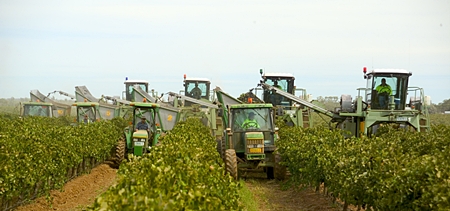If you normally turn your nose up at boxed wines, I’ve got good news for you. They are getting better. Wine in boxes (or “cask wines”) first found commercial success in Australia, where they were invented in the 1960s. They’ve gradually caught on in Europe and America but in the past, they had a rather down-market image.
Two new cask wines from Cedar Creek are, however, a cut above much of the competition. They’re from the Riverina wine region of New South Wales and are amazingly good value.
 Machine harvesters pick grapes at Cedar Creek’s Yenda vineyard.
Machine harvesters pick grapes at Cedar Creek’s Yenda vineyard.
Let’s look for a moment the advantages of wine in boxes. As the wine is poured, the bag slowly collapses inside the box, ensuring that the air doesn’t make contact with the wine. So unlike a bottle, the wine stays fresh for a few weeks after opening, because it’s not subject to oxidation.
There’s no cork taint either and because packaging, shipping and storage are less expensive, casks are invariably better value than bottles. If you normally don’t finish an entire bottle in one evening (although I rarely have this problem) the cask is ideal, because you can pour out just what you want, knowing that the rest of the wine will not go off. Cask wines are easy to open; they’re more environmentally friendly than bottles and they can be carried around easily and safely.
These two wines are terrific bargains. The 4.5 litre cask is equivalent to six standard bottles – so it works out at about Bt.150 for a standard bottle, which would normally cost you about Bt.350. Now, if that’s not a bargain, I don’t know what is.
“Cedar Creek” Chardonnay 2011 (white), Australia. (Villa Bt. 950 for 4.5 litre box)
This Chardonnay is a brilliant gold, with a striking aroma of apples and sweet peaches, with faint hints of pineapple, oranges and herbs. It has a very smooth mouth-feel, with just a touch of acidity. You’ll get apples, peaches and ripe tropical fruits on the taste and a hint of oakiness in the background. It’s dry, but just a hint of sweetness. It has a decently long finish too, with a zesty citrus taste.
The wine has just over 12% alcohol content and it’s a pleasant easy-drinker that could well appeal to those people who don’t normally drink wine. You could serve it with fish or chicken dishes, but it’s pleasant enough to drink on its own as a light refresher before dinner.
“Cedar Creek” Shiraz – Cabernet Sauvignon 2011 (red), Australia. (Villa Bt. 950 for 4.5 litre box)
From the heart of New South Wales, this ruby-red wine seems – at first sniff – more like a Shiraz than a Cabernet, perhaps because Shiraz (SHEE-razz) accounts for 80% of the blend. The aroma brings you dark fruit, blackcurrants, plums and spices, cinnamon and herbs. The wine has a soft velvety mouth-feel with firm but soft tannins, giving a good framework to the body. Plums and blackcurrants are on the taste too and although it’s a really dry wine, the forward fruit gives hints of sweetness. There’s a really long and pleasing dry finish too.
It’s rather French in style and perhaps because of the Shiraz, it reminds me of a light Rhône, or one of those attractive easy-drinkers from the Languedoc. It’s delightful to enjoy on its own, but at 13% alcohol content, you may prefer it with food. I think it would partner many dishes successfully; most meats, barbeques or even pizza would work well.
This wine is quite a lot better than many other boxed reds around at the moment and a good deal more interesting too. But far be it from me to make comparisons with its well-known competitors. As they say in the Army, “No names, no pack-drill.” Or so my father told me.
Both these wines would be great dinner drinks and at these prices, you could bring them out for a party. If you want to conceal the box and aerate the wine at the same time, just fill your decanter in the kitchen in advance. I bet nobody will guess that it’s come out of box. And honestly, I won’t say a word.




